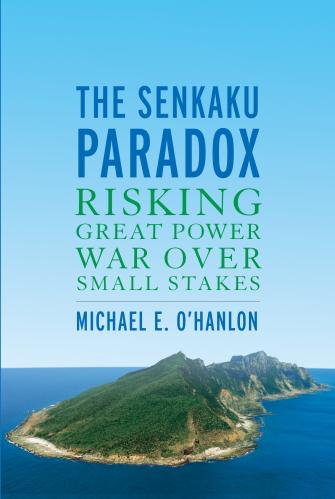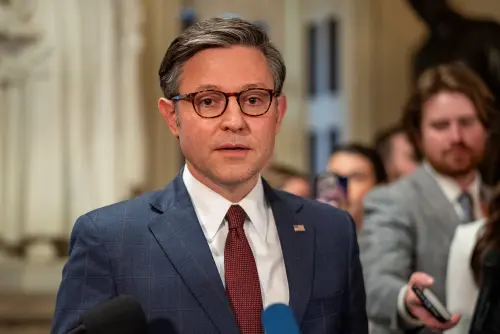The United States faces a growing array of security challenges that will require focused strategic thought and budgetary commitment in the coming years. From the generational challenge of renewed competition with China and Russia to the threat posed by rogue actors like North Korea, the United States will be unable to address all these issues head-on without sustained bipartisan, bicameral focus.
On October 31 — just hours after the Washington Nationals’ historic victory in the World Series — Brookings hosted Senator Chris Van Hollen (D-MD) for a discussion with Senior Fellow Michael O’Hanlon on these and other issues. Sen. Van Hollen sits on the Senate Committee on Appropriations and the Senate Committee on the Budget, among others.
O’Hanlon opened the conversation by asking Senator Van Hollen about the National Defense Strategy, and if it has been useful in focusing U.S. attention on great-power competition. Van Hollen said that the strategy is a positive one, but it’s not clear if President Trump’s own actions — such as in Syria and other places — reflect its underlying themes. On great-power competition, Van Hollen said he expects America’s traditional challenges with Russia to endure, and that it’s important to make clear to Moscow that its destabilizing behavior should end. He warned that the Trump administration has done much to expand Russia’s influence in the Middle East. Nevertheless, there are areas of overlapping interest — such as nuclear nonproliferation — where both countries should strive to make progress.
Asked about election security, Van Hollen pointed to the bipartisan legislation he introduced with Senator Marco Rubio (R-FL) — the DETER Act — which would impose significant sanctions on Putin if the United States caught Russia interfering in U.S. elections. However, Van Hollen assessed that the U.S. government has done a “terrible job” in deterring and preventing future foreign interference.
Asked by O’Hanlon to assess the stability and security of Eastern Europe, Van Hollen said the United States’ overall strategy has been successful on hard defense, but there remains a “fundamental question of credibility of deterrence,” particularly when the Trump administration criticizes the NATO alliance as it has.
Moving to the Western Pacific, Van Hollen agreed that while the Indo-Pacific is the main theater of U.S. competition, it is not in the U.S. interest to get into a new “cold war” with China if it can be avoided. But he said:
We do need to take the economic competition very seriously because if you look at the way China has gone about building their economy, in some ways it’s as a result of unleashing more market forces, but it’s also been largely driven by sort of state-run command strategy of investing in key technologies, starting their own state-run businesses, and stealing a lot of U.S. technology over a very long period of time.
To compete with China, Van Hollen said the United States must build up its strengths — including in education, innovation, and competitiveness. However, one area where Van Hollen said he agrees with the Trump administration has been on blocking the access of Chinese firms like Huawei to the U.S. market. Van Hollen noted he introduced a bill with Senator Tom Cotton (R-AR) to prevent the president from taking Huawei off the Commerce Department blacklist without congressional approval.
On Taiwan, Van Hollen stressed that the United States must “continue to maintain our relationship with Taiwan and make it clear that any effort by China to use military force would be a very bad idea.” Then, on North Korea, Van Hollen said that while he is not opposed to talking with adversaries, President Trump has elevated Kim Jong Un to the international stage without having accomplished his stated goal of denuclearizing the Korean Peninsula. He’s worried that the high-level engagement has made it more difficult to keep sanctions in place. With Iran, the nuclear deal was an important milestone, but the Iranian regime remains a bad actor. Because the Trump administration has undermined the agreement and threw America’s European allies under the bus, the United States has limited tools at this point to deal with Iran’s intransigence.
On South Asia, Van Hollen underscored how important the U.S.-India relationship is given India’s size and population. He drew attention to India’s decision to abrogate Kashmir’s autonomy, which increased the likelihood it could be a flashpoint in the turbulent relationship with Pakistan. Dialogue and transparency are vital to preventing miscommunication between these nuclear states.
Finally on the defense budget, Van Hollen said that the United States must still deal with the wear and tear experienced by the military in recent decades. He signaled opposition to spending $1.3 trillion on nuclear modernization, although he said that the forces should be modernized for deterrent purposes while renewing the New START arms control agreement with Russia. He said the Congress should “bring down overall military spending consistent with readiness and look for savings.”






Commentary
Highlights: Sen. Van Hollen discusses US defense and foreign policy at Brookings
November 15, 2019